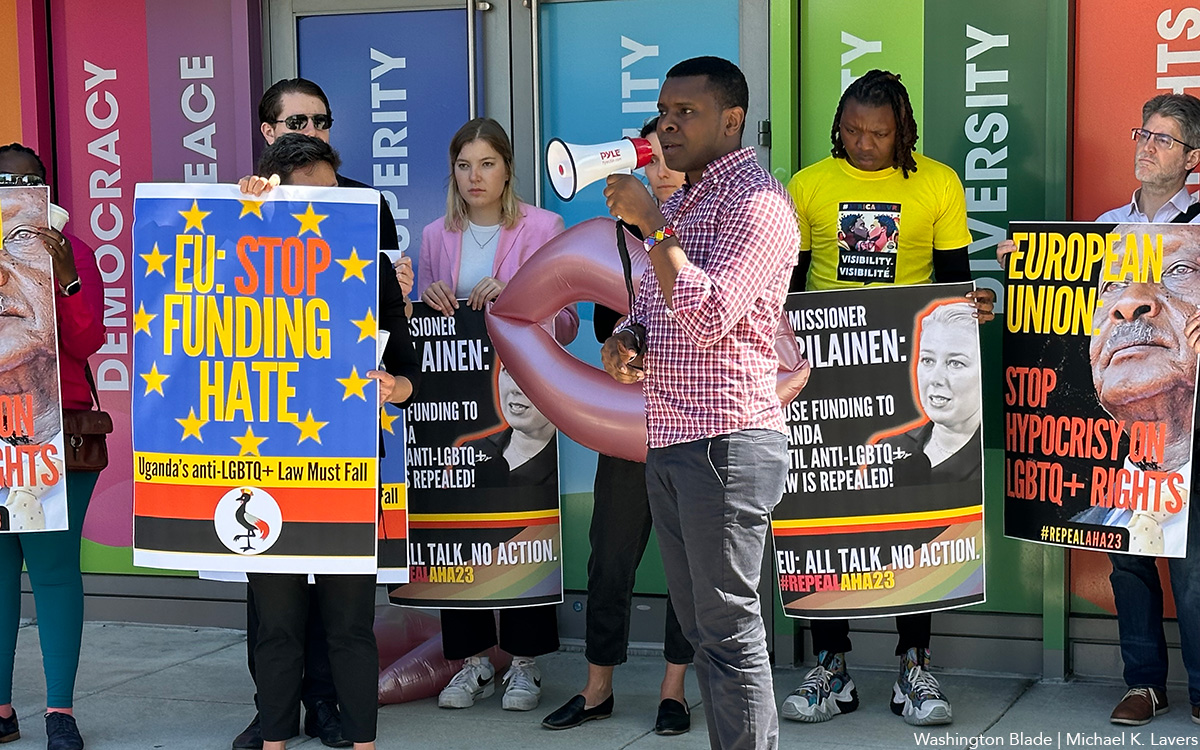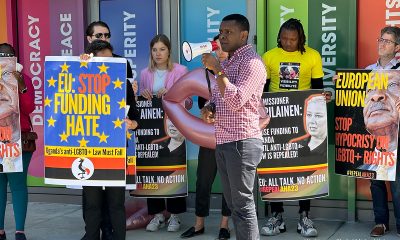World
USAID denies report that suggests it funds conversion therapy
OpenDemocracy report focuses on Kenya, Tanzania and Uganda

A six-month investigation conducted by openDemocracy has revealed multiple aid-funded health facilities in three African countries have been administering conversion therapy to patients.
“Health facilities in Kenya, Tanzania and Uganda have provided, or provided referrals for, controversial anti-gay ‘conversion therapy’ to ‘quit’ same-sex attraction,” said openDemocracy in a statement.
Additionally, the statement mentions that undercover reporters who spoke to some staff at these facilities were offered help to quit same-sex attraction and were told that “being gay is ‘evil;’ and homosexuality is ‘for whites’, caused by peer pressure and a mental health problem.” They were advised to “give a gay teenager a sleeping pill to prevent him from masturbating.”
In an article that highlights their findings, openDemocracy reports that a receptionist at Mulago National Referral Hospital, Uganda’s largest public hospital and HIV clinic for marginalized and most-at-risk populations, said that an undercover reporter’s 17-year-old gay brother could “quit” his same-sex attraction.
“Whoever wants to quit homosexuality, we connect them,” said the receptionist to outside counselors, who have included Pastor Solomon Male, a well-known gay rights opponent in the area.
The receptionist also referred the undercover reporter to a former patient who she claimed was no longer gay and gave the reporter the patient’s phone number.
Mulago, like a number of health facilities in Africa, receives foreign aid and funding from organizations like the U.S. Agency for International Development, the Global Fund, PEPFAR and the U.K.-based NGO MSI Reproductive Choices.
OpenDemocracy reports the Uganda Catholic Medical Bureau network received more than $1 million from USAID between 2019 and April 2021. It remains uncertain whether the specific hospitals identified in investigations received any of this money.
The donors in response to the investigation’s findings have committed to launching a separate investigation into the health facilities and taking action against so-called conversion therapy practices they are administrating.
“We strongly condemn this harmful, unethical practice, which goes against everything we stand for as an organization,” an MSI Reproductive Choices spokesperson told openDemocracy. “We are grateful for all safeguarding concerns raised and thank openDemocracy for their investigation.”
MSI Reproductive Choices also receives millions in aid from the British government and other international donors to specifically provide health services to marginalized communities, including gay men and transgender people.
Survivors of anti-LGBT treatments’ in Kenya, Tanzania and Uganda have come forward to describe their experiences with conversion therapy.
“I was not allowed to make or receive any phone calls. They also gave me a lot of drugs that made me drowsy and exhausted all the time,” said Samuel (not his real name) to openDemocracy of his experience with conversion therapy. “I felt abandoned and was afraid I was going to die.”
Samuel’s parents sent him to a conversion therapy institute for a year and a half. OpenDemocracy said he was given electric shocks and shown pictures of “ruptured anuses and wounded penises” by people who told him that if he didn’t stop being gay, he would “meet the same fate.”
A transgender woman in Tanzania recounted that her mother took her to a hospital in Dar es Salaam, the country’s commercial capital, where a doctor attempted to convince her that being trans is improbable.
OpenDemocracy also cites two men in Kenya who said they received hormones to appear more ‘masculine’ and to limit a trans person’s ability to present in their preferred gender.
As investigations into the allegations ensue, aid donors have begun to take action regarding health facilities that prescribe conversion therapy.
Kaajal Ramjathan-Keogh, the Africa director at the International Commission of Jurists, a human rights organization, told openDemocracy that aid donors should ensure their money does not fund any conversion therapy activities — and to withdraw money if it does..
“Redirect funding,” said Yvee Oduor of the Gay and Lesbian Coalition of Kenya. “We already have clinics and health centres run by LGBTQI+ people all over the country. Why not fund these community initiatives?”
A USAID spokesperson in a statement to the Washington Blade said the agency “does not fund or promote anti-LGBTQ+ conversion therapy.”
“The United States government, through staff at the U.S. Embassy in Uganda, has engaged leadership of the Uganda Catholic Medical Bureau and the Infectious Disease Institute (IDI) Uganda concerning the allegations cited,” said the spokesperson. “IDI subgrants to the Most At Risk Populations Initiative (MARPI) clinic in Kampala, with U.S. funding.”
The USAID spokesperson told the Blade that officials from the U.S. Embassy in Uganda “emphasized the need to ensure support for key populations, including the LGBTQ+ community.” The spokesperson added “the implementing partners agreed to take steps to ensure” that “appropriate gender and sexual diversity training is provided to all implementing partner staff and health care workers and ensure refresher trainings” are carried out, that “hiring practices include principles of nondiscrimination in personnel contracts” and “a patient’s bill of rights is posted in facilities, and service delivery issues raised through PEPFAR’s Community-led Monitoring program are addressed.”
European Union
Activists demand EU sanction Uganda over Anti-Homosexuality Act
Yoweri Museveni signed law on May 29, 2023

More than a dozen activists who protested in front of the European Union Delegation to the United States in D.C. on Thursday demanded the EU to sanction Uganda over the country’s Anti-Homosexuality Act.
Hillary Innocent Taylor Seguya, a Ugandan LGBTQ activist, and Global Black Gay Men Connect Executive Director Micheal Ighodaro are among those who spoke at the protest. Health GAP Executive Director Asia Russell also participated in the event that her organization organized along with GBGMC and Convening for Equality Uganda, a Ugandan LGBTQ rights group.
Ugandan President Yoweri Museveni last May signed the Anti-Homosexuality Act that, among other things, contains a death penalty provision for “aggravated homosexuality.”
The country’s Constitutional Court on April 3 refused to “nullify the Anti-Homosexuality Act in its totality.” A group of Ugandan LGBTQ activists have appealed the ruling.
A press release that Health GAP issued ahead of Thursday’s protest notes EU Commissioner for International Partnerships Jutta Urpilainen on March 6 announced more than €200 million ($212.87 million) for Uganda in support of “small business owners, young female entrepreneurs, agribusinesses as well as vital digital infrastructure projects in full Team Europe format with the European Investment Bank (EIB) and several member states.”
“These concrete initiatives will make a difference to aspiring entrepreneurs, Ugandan businesses and create jobs in multiple sectors,” said Urpilainen in a press release that announced the funds. “This is a perfect example of how Global Gateway can make a tangible difference for citizens and businesses and unlock the full potential of a partner country by working together.”
Convening for Equality Uganda on Tuesday in a letter they sent to Urpilainen asked the EU to review all funding to Uganda and “pause or reprogram any funds that go via government entities.” The protesters on Thursday also demanded European Commission President Ursula von der Leyen “to hold Ugandan President Museveni’s government accountable for this attack on human rights.”
Josep Borrell, the EU’s top diplomat, in a statement he released after Museveni signed the Anti-Homosexuality Act said the law “is contrary to international human rights law and to Uganda’s obligations under the African Charter on Human and People’s Rights, including commitments on dignity and nondiscrimination, and the prohibition of cruel, inhuman or degrading punishment.”
“The Ugandan government has an obligation to protect all of its citizens and uphold their basic rights,” said Borrell. “Failure to do so will undermine relationships with international partners.”
“The European Union will continue to engage with the Ugandan authorities and civil society to ensure that all individuals, regardless of their sexual orientation and gender identity, are treated equally, with dignity and respect,” he added.
Urpilainen last September in a letter to the European Parliament said the EU would not suspend aid to Uganda over the law.
India
Indian political parties for the first time include LGBTQ rights in election platforms
Voters will begin to cast ballots on April 19

The world’s largest democratic exercise will begin in India on April 19 as citizens begin to cast their votes in the country’s election.
This year’s election is different because national level political parties for the first time are promising to extend marriage rights to same-sex couples as part of their election platforms.
The Indian National Congress, one of India’s oldest political parties, promised after wide consultation that it would introduce a bill that would recognize civil unions between couples who are part of the LGBTQ community. The party, which has governed India for the majority of the period since independence from the U.K. in 1947, has refrained from taking a stance on laws that include Section 377, which criminalized consensual same-sex sexual relations.
Then-Health Minister Gulam Nabi Azad in 2011 when the INC was in power said homosexuality is a disease. He made the controversial comment while speaking at an HIV/AIDS conference in New Delhi, the Indian capital.
“Unfortunately, this disease has come to our country too,” said Azad. “Where a man has sex with another man, which is completely unnatural and should not happen but does.”
When the Delhi High Court was hearing the Naz Foundation case, the Home Affairs Ministry opposed the striking down of Section 377 based on its belief that homosexuality cannot be morally condoned. The INC never struck down Section 377, which criminalized homosexuality, in parliament.
A 5-judge panel on the Supreme Court on Sept. 6, 2018, decriminalized consensual same-sex sexual relations.
The Communist Party of India (Marxist) on April 4 unveiled its platform with a range of socialist commitments, including support for LGBTQ rights. Among these pledges is to amend the Transgender Persons (Protection of Rights) Act 2019 to address community concerns and ensure legal recognition and protection for same-sex couples akin to marriage.
The platform also outlined plans to introduce a bill similar to the Special Marriage Act of 1954, which allows partners to be listed as dependents and facilitating like inheritance, alimony in the event of divorce and other issues. The party further pledged to enact a comprehensive anti-discriminatory bill that would include LGBTQ people, ensure quotas in educational institutions and implement horizontal reservations in employment.
Addressing the issue of crimes against LGBTQ people, the platform promised to treat such offenses on par with crimes against heterosexuals. The platform also calls for tackling bullying, violence and harassment of gender non-conforming and LGBTQ people in educational settings, enforcing anti-hazing policies and combating hazing based on sexual orientation and gender identity.
The platform further touched issues related to transition and informed consent.
The Special Marriage Act of 1954 is a law that provides for civil unions among Indians and Indian nationals who live abroad, regardless of the religion or faith followed by either party. This law enables people from two different religious backgrounds to enter into marriage. Parliament in 2019 passed the Transgender Persons (Protection of Rights) Act that extended rights to trans people.
Brinda Karat, a former member of the Rajya Sabha, the upper house of the Indian Parliament, and leader of the Communist Party of India (Marxist), spoke with the Washington Blade and said the current government has homophobic ideas that are not acceptable to the party.
The ruling government under Prime Minister Narendra Modi is striving to secure more than 400 parliament seats in the upcoming election, aiming for a substantial majority.
Various polls conducted by Indian news organizations indicate a probable victory for the ruling Bharatiya Janata Party. In response to the BJP’s dominance, Congress and several national and regional parties have joined forces as the Indian National Developmental Inclusive Alliance.
This alliance comprises 26 opposition political parties. Despite its formation, however, there is no clear coalition strategy in place and only two parties have included LGBTQ-specific policies in their election platforms.
The Blade reached out to Congress’ spokesperson for comment, but has not received a response. The BJP also did not respond to a request for comment.
The party has yet to release its election platform.
Ankush Kumar is a reporter who has covered many stories for Washington and Los Angeles Blades from Iran, India and Singapore. He recently reported for the Daily Beast. He can be reached at [email protected]. He is on Twitter at @mohitkopinion.
Africa
Ugandan activists appeal ruling that upheld Anti-Homosexuality Act
Country’s Constitutional Court refused to ‘nullify’ law

Twenty-two LGBTQ activists in Uganda have appealed this month’s ruling that upheld the country’s Anti-Homosexuality Act.
The Constitutional Court on April 3 refused to “nullify the Anti-Homosexuality Act in its totality.”
President Yoweri Museveni last May signed the law, which contains a death penalty provision for “aggravated homosexuality.”
The U.S. subsequently imposed visa restrictions on Ugandan officials and removed the country from a program that allows sub-Saharan African countries to trade duty-free with the U.S. The World Bank Group also announced the suspension of new loans to Uganda.
Media reports indicate Sexual Minorities Uganda Executive Director Frank Mugisha and Jacqueline Kasha Nabagesara are among the activists who filed the appeal.
-

 District of Columbia2 days ago
District of Columbia2 days agoReenactment of first gay rights picket at White House draws interest of tourists
-

 District of Columbia2 days ago
District of Columbia2 days agoNew D.C. LGBTQ+ bar Crush set to open April 19
-

 Arizona2 days ago
Arizona2 days agoAriz. governor vetoes anti-transgender, Ten Commandments bill
-

 Africa4 days ago
Africa4 days agoUgandan activists appeal ruling that upheld Anti-Homosexuality Act










